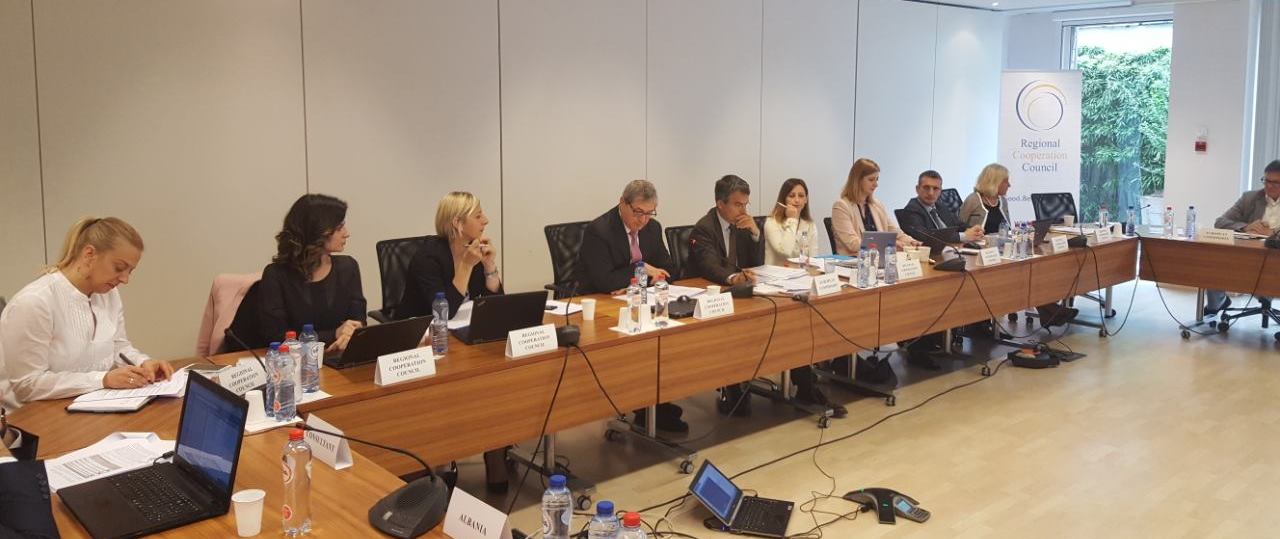SEE 2020 Monitoring Committee discusses initial findings of the SEE 2020 Strategy Annual Report on Implementation
30 May 2017

SEE 2020 Monitoring Committee discusses initial findings of the SEE 2020 Strategy Annual Report on Implementation at its 4th meeting in Brussels, 30 May 2017 (Photo: RCC/Nedima Hadziibrisevic)
Brussels – Monitoring Committee of South East Europe’s 2020 (SEE 2020) Strategy met in Brussels today at the technical meeting focused on monitoring process of the Strategy, to discuss initial findings of the draft Strategy’s Annual Report on Implementation (ARI), review the proposals for the revised headline targets and synergise efforts with other monitoring frameworks in SEE.
“The preliminary results presented in the draft ARI show mixed results in SEE 2020 Strategy implementation in the past year. A number of SEE 2020 headline targets have been already met, alike the one on the trade balance and on increasing the number of highly qualified persons within the workforce. The overall progress can be summarized as a long awaited rebound in terms of employment and trade rebalancing. However, there is still a lot to be done as the greatest challenges remain meeting the targets that measure growth, convergence with the EU, trade growth and intra-regional trade”, said Gazmend Turdiu, Deputy Secretary General of the Regional Cooperation Council (RCC)
Bernard Brunet, Head of Unit at European Commission’s DG NEAR stressed out the importance of the Monitoring Committee, its regular meetings and reporting mechanisms.
„Although the meetings are of technical character, its regularity and availability of monitoring reports on the implementation of the SEE 2020 Strategy are very important not only for the visibility of the Strategy itself but also as reiterated message that the SEE 2020 Strategy remains in focus of the policy makers in the region.“
Mr. Brunet also provided reflection on the mutually-reinforcing link between the Economic and Reform Programme (EPR) process and the SEE 2020 Strategy, stating that the identification of credible targets and indicators, are of the outmost importance when designing the measures as part of the ERPs.
The meeting heard presentations and discussed the progress in preparation of the four new SEE 2020 headline targets, which will be discussed by the Governments representatives at the upcoming Governing Board meeting at the end of June.
The participants of the fourth SEE 2020 Monitoring Committee meeting were informed about the state of play of development of RCC’s online platform for the Strategy’s collection of quantitative data, which will facilitate data collection process, increase transparency and provide for better accuracy over the years. They discussed already established cooperation with international organisations involved in the monitoring process, such as Eurostat and OECD, as well as examined establishment of links with other data collection processes which will strengthen coordination of data exchange, data collection timelines, avoiding overlap.
SEE 2020 Monitoring Committee brings together representatives of statistical systems and policy makers from each of the SEE 2020 participating economies. The Committee oversees the overall process of monitoring the SEE 2020 Strategy that also helps optimise the process, modify the scope of monitoring as necessary, and report to the SEE 2020 Governing Board on issues pertaining to implementation and monitoring of the SEE 2020 Strategy.
The meetings of the SEE 2020 Monitoring Committee are convened and organised by the RCC.



